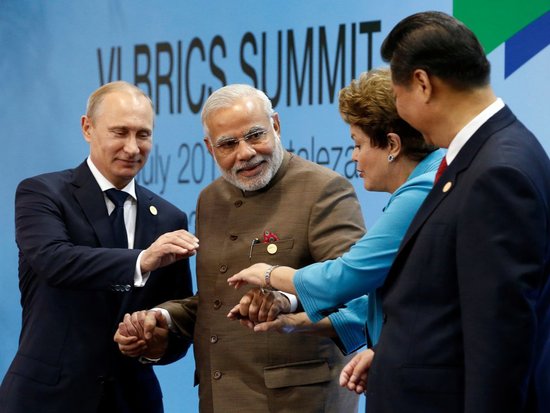http://bricsmagazine.com/en/articles/one-should-socialize-more
The article is available in Russian here.
Oliver Stuenkel firmly believes that if ordinary Brazilians, South Africans, Indians, Russians and Chinese people spent an evening in each other’s company over a glass of wine, they could bring the BRICS countries closer together better than any efforts by diplomats.
—————
One of the major challenges the BRICS countries face is that their societies remain relatively isolated from each other. This is due to a number of historical and structural factors that are not easy to change. As a consequence, investors, academics and even government officials are often unaware of the potential for co-operation. Except for China, which has strong economic ties with all the other BRICS, intra-BRICS trade is surprisingly low. Brazil’s trade with India, for example, is a mere $10 billion, seven times smaller than Brazil’s economic ties with China. The same applies to the other BRICS, whose trade is dominated by China. Intra-BRICS trade in total is smaller than the BRICS’ trade with Africa, showing how disunited the BRICS are on the economic front.
In response, intra-BRICS co-operation today ranges from public health, trade facilitation, agriculture, cities, and the revenue office, to statistics, co-operatives, academia, the judiciary and defense. In a specific attempt to deal with low economic cooperation, BRICS governments have set up a series of initiatives to tackle the problem and find ways to increase trade. Four stand out: regular meetings between BRICS trade ministers; BRICS competition authorities; the BRICS co-operatives forum; and the BRICS Business Forum (along with a Business Council).
What can all these initiatives achieve? It is unlikely that we will see any grand projects such as a BRICS free-trade agreement. Rather, policymakers will focus on bureaucratic issues such as visa and customs procedures, promoting more frequent flight and shipping connections and the use of each other’s currencies in intra-BRICS trade.
While focusing on reducing trade barriers is important, what matters even more is simply facilitating people-to-people interactions. Over the past years, impressive progress has been made in this sense. A visa waiver agreement between Brazil and Russia, in effect since 2010, has allowed tourism between the two countries to increase markedly. A similar agreement has made travel between Brazil and South Africa easier as well. Since early 2013, citizens from Brazil and Russia have been able to spend 72 hours in Beijing or Shanghai without a visa.
These examples show that political willingness can go a long way in allaying concerns about security and illegal migration. The next step should be a visa waiver program between all BRICS countries, allowing tourists, business travelers and academics to stay up to three months in any BRICS country without applying for a visa before their trip.
Aside from boosting trade ties, stronger people-to-people ties are important to identify areas for strategic co-operation. Just as much as trade and travel is limited between the BRICS, the mutual flow of ideas is also scarce.
These shortcomings can only be addressed in a meaningful way if governments do even more to bring their citizens together by promoting student exchanges, organizing cultural events in each other’s countries and increasing travel and trade routes. Yet governments are not the only ones – indeed, they can merely create the right conditions for civil society and the private sector to do the actual work.
It is particularly in moments of geopolitical tensions that universities, NGOs, artists and journalists need to continue cooperation and assure that people-to-people contacts between the BRICS remain vibrant – even if Russia becomes the target of widening Western sanctions. For example, Fundação Getulio Vargas (FGV) in São Paulo welcomes many Russian exchange students, several of whom have established meaningful professional ties to Brazil upon returning to Moscow and St. Petersburg.
It is easy to mock the idea of meetings for the sake of meetings. But they can create webs of mutual trust and friendship that leaders, businesspeople, students and academics can draw on in a crisis – and conversations over late-night drinks can do more to draw countries together than all the diplomats in the world. If BRICS leaders seize the opportunity, the Sixth BRICS Summit in Fortaleza, Brazil, in July 2014 will be another important step towards creating the right conditions to allow people-to-people ties between Brazil, Russia, India, China and South Africa to prosper.









